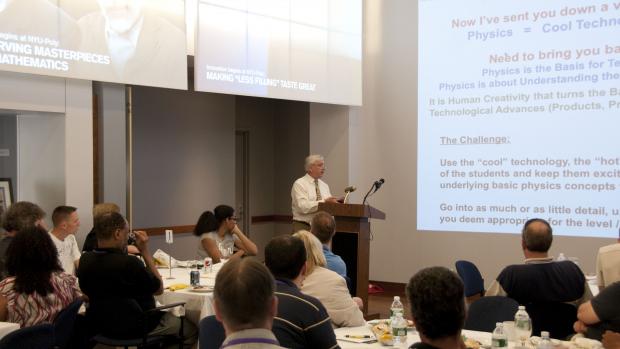Educators Get Energized at Summer Institute
NYU-Poly program exposes teachers to cutting-edge research and instruction methods in math, science, technology and engineering.

Kurt Becker, the associate provost for research and technology initiatives at the Polytechnic Institute of NYU, said people use a lot of words to describe physics, and “fun” isn’t usually one of them.
“There’s a perception in the public that physics is taught by old white men with white hair, weird hair or no hair,” he said. Want to stop a conversation at a dinner party? Tell everyone you’re a physicist, he added.
The perception is unfortunate, but Becker aims to change all that. He was speaking to a group of about 30 teachers who came to the NYU-Poly campus in Brooklyn as part of the school’s Summer Institute for Educators.
The program is an initiative of the Office of Undergraduate Admissions and exposes educators to NYU-Poly’s i2e educational paradigm that infuses creativity into NYU-Poly’s curricula. The intention is that the educators will go back to their home schools and incorporate what they’ve learned into their classrooms.
The Summer Institute, which ran from July 13 to July 18, consists of lectures and hands-on labs on subjects ranging from cyber security to mechanical engineering. One of the most popular labs was conducted by assistant professor Maurizio Porfiri, who teaches in the Mechanical and Aerospace Engineering Department.
Porfiri, who founded the Dynamical Systems Laboratory at NYU-Poly, has earned acclaim for his work on underwater robotics, including biomimetic robotic fish that are shedding light on leadership patterns in nature. His research could affect fields ranging from animal behavior science to marine life conservation.
Joy Colelli, Dean of Admissions and New Student Services, said information about the program is sent to high schools known for rigorous academic programs, and teachers are invited to apply. She said the institute is unique because it touches on several different engineering and science disciplines and was designed to infuse creativity into a high school STEM curricula.
Becker, who was speaking at a lecture called “Making Physics Fun,” said one of the keys to getting students excited about such subjects is to show them that physics is all around us, all the time.
It’s the basis for many technologies we take for granted, including the laser, radio and television, space exploration, computers and gadgets like the microchip. It is possible to use cool technology to grab students’ attention and get them excited while teaching the underlying concepts to them at the same time, he said.
“How we interact with and engage students is as important as what we teach,” he said.
Tom Peri, a science teacher at Notre Dame Preparatory School in Towson, Maryland, said his school is starting a new course in engineering next year and he came to the Summer Institute to hear about ways to make that course successful.
Stephen Kunec, who teaches at an all-girls school, Dana Hall, in Wellesley, Massachusetts, said he often gets a negative reaction when he tells people what he teaches.
“You can substitute everything we just heard here about physics for math,” he said. “When I tell people I teach math at a dinner party, I get ‘I hate math,’ instead of silence.”
He said it’s important to learn new ways to motivate students because teachers struggle to be creative and interesting while adhering to state mandates.
Colelli said the Summer Institute is in its first year, and she expects that NYU-Poly will be able to offer it again next summer.




